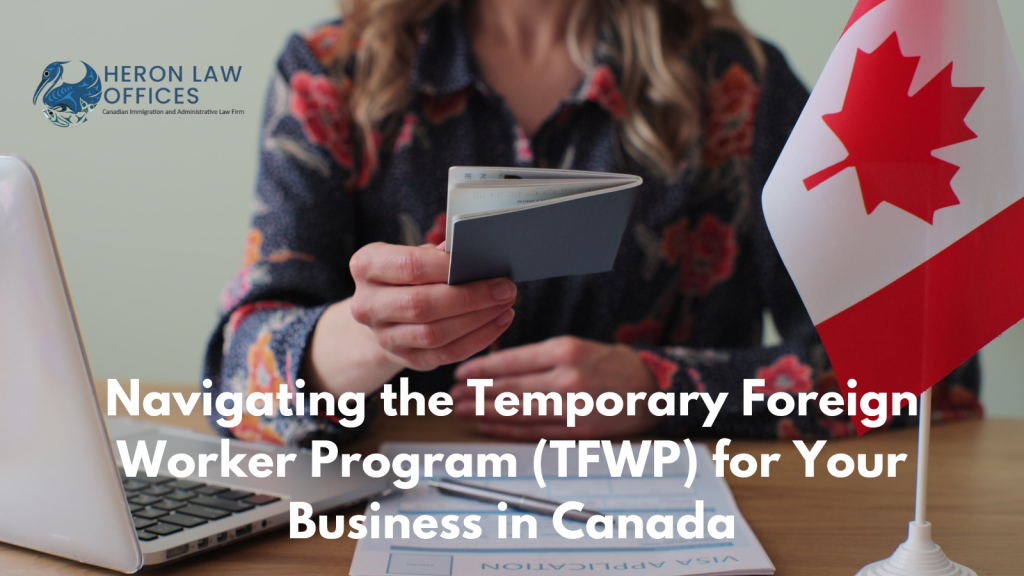
By Laura Schemitsch, Canadian Immigration Lawyer at Heron Law Offices.
Canada needs immigration in order to offset its aging population. It is predicted that there will only be 3 workers for every retiree by 2030, compared to 6 workers in 1980. According to Statistics Canada, “rising inflation, shortage of labour force, and retaining and recruiting skilled employees are the leading challenges businesses expect to face short term.” As such, the hiring of temporary foreign workers will be an important solution for businesses facing chronic labour shortages that negatively impacts their business in the short and long term.
Typically, an employer needs a positive Labour Market Impact Assessment (“LMIA”) in order to hire a temporary foreign worker through the Temporary Foreign Worker Program (“TFWP”). According to Employment and Social Development Canada (“ESDC”), the TFWP allows Canadian employers to hire foreign workers to fill temporary jobs when qualified Canadians and permanent residents are not available. LMIAs are regulated in accordance with the Immigration and Refugee Protection Act (“Act”) and the Immigration and Refugee Protection Regulations (“Regulations”).
1. What is an LMIA:
A positive LMIA is a document issued by ESDC that confirms that your business needs to hire a foreign worker.
2. Does my business need to apply for a high-wage or low-wage LMIA?
The wage your business offers for the position will determine if you need to apply for a LMIA under the stream for high-wage positions or the stream for low-wage positions.
- If you are offering a wage to a temporary foreign worker (TFW) that is:
- at or above the provincial or territorial median hourly wage, you must apply under the stream for high-wage positions
- below the provincial or territorial median hourly wage, you must apply under the stream for low-wage positions
Both streams have their own specific application requirements. Given the complexity of the LMIA process and the importance of following the procedure correctly, hiring an immigration lawyer who is familiar with the process can be very beneficial in assessing the appropriate stream and guiding your business through the details.
Low Wage LMIA:
- Your business must pay for the round-trip transportation costs for TFWs to arrive at their work location in Canada at the beginning of their work period, and to return to their country of residence at the end of their work period. These transportation costs must not be recovered from the TFW.
- You must provide or ensure that suitable and affordable housing is available for the TFW you will employ.
- As of April 30, 2022, employers are subject to a 20% cap limit on the proportion of TFWs they can hire in low-wage positions at a specific work location. The following sectors are eligible for a 30% cap:
-
- Construction (NAICS 23)
- Food manufacturing (NAICS 311)
- Wood product manufacturing (NAICS 321)
- Furniture and related product manufacturing (NAICS 337)
- Hospitals (NAICS 622)
- Nursing and residential care facilities (NAICS 623)
- Accommodation and food services (NAICS 72)
High Wage LMIA:
- A transition plan is a mandatory requirement to hire TFWs in high-wage positions which describes the activities your business agrees to undertake to recruit, retain and train Canadians and permanent residents to reduce your reliance on the TFWP.
3. Can I hire foreign workers through the Global Talent Stream?
The Global Talent Stream (“GTS”) offers faster processing times for highly skilled global talent.
- You may be eligible for Category A of the Global Talent Stream if you have been referred to the GTS by one of the stream’s designated referral partners and if you’re hiring an individual with unique and specialized talent to help your business scale up and grow.
- If the requested occupation is included on the global talent occupations list, it’ll be processed as a Category B application and must meet Category B requirements. Or,
- You may be eligible for Category B of the GTS if you are seeking to hire highly skilled temporary foreign workers (“TFWs”) to fill positions in in-demand occupations found on the global talent occupations list. A referral is not required to be eligible for Category B.
- If you hire a worker through the GTS, you must develop a Labour Market Benefits Plan (LMBP).
4. Do I have to prove that I advertised?
Yes. As part of the TFWP requirements, your business must conduct recruitment efforts to hire Canadians and permanent residents before offering a job to a TFW. The high-wage and low-wage LMIA streams have different advertising requirements that must be followed closely.
5. What is the expiry date for LMIAs?
Recently, as of October 31, 2023, a Labour Market Impact Assessment (“LMIA”) is valid to support a temporary foreign worker’s (TFW) work permit application to Immigration, Refugees, and Citizenship Canada (“IRCC”) for a maximum period of 12 months after it is issued.
Working with Heron Law Offices to Hire a TFW with an LMIA

-
Assessing your business’ eligibility:
We will meet with an authorized individual from your business to assess your eligibility to hire TFWs and the most suitable LMIA stream. We will explain the process and approximate timelines so you can make an informed decision.
-
Preparing your LMIA application:
We can assist your business in obtaining its first LMIA. In British Columbia, the first step is to register to hire temporary foreign workers with the province. Your business will also need to register on Job Bank and prepare job advertisements according to specific criteria provided by ESDC. We will also advise you on the application form and documents needed to show business legitimacy, prepare legal submissions in support of your application, and submit your LMIA application via the new LMIA online portal.
-
Ensuring Employer Compliance:
As an employer hiring temporary foreign workers, you must be aware of your obligations as an employer, the reasons and authority for an inspection, and the serious consequences of non-compliance in order to ensure your compliance with the TFWP.
Canadian law protects all workers in Canada, including TFWs. The exploitation of TFWs is considered a violation of Canadian laws and human rights.
Employers must:
-
- pay TFWs for all work, including overtime, where required by law
- provide workplace safety insurance
- offer TFWs the same benefits, and
- not take the TFWs identification
We can also assist employers to prepare for a compliance inspection.
-
Helping with a Work Permit Application
Once your business obtains a positive LMIA, we can also assist the TFW with their employer-specific work permit application.
TFWs under the low wage stream are eligible for an employment duration of 2 years and an employment duration of 3 years under the high wage stream.
Reach out to Heron Law Offices today to book your consultation with a lawyer to discuss your business’ LMIA needs.

